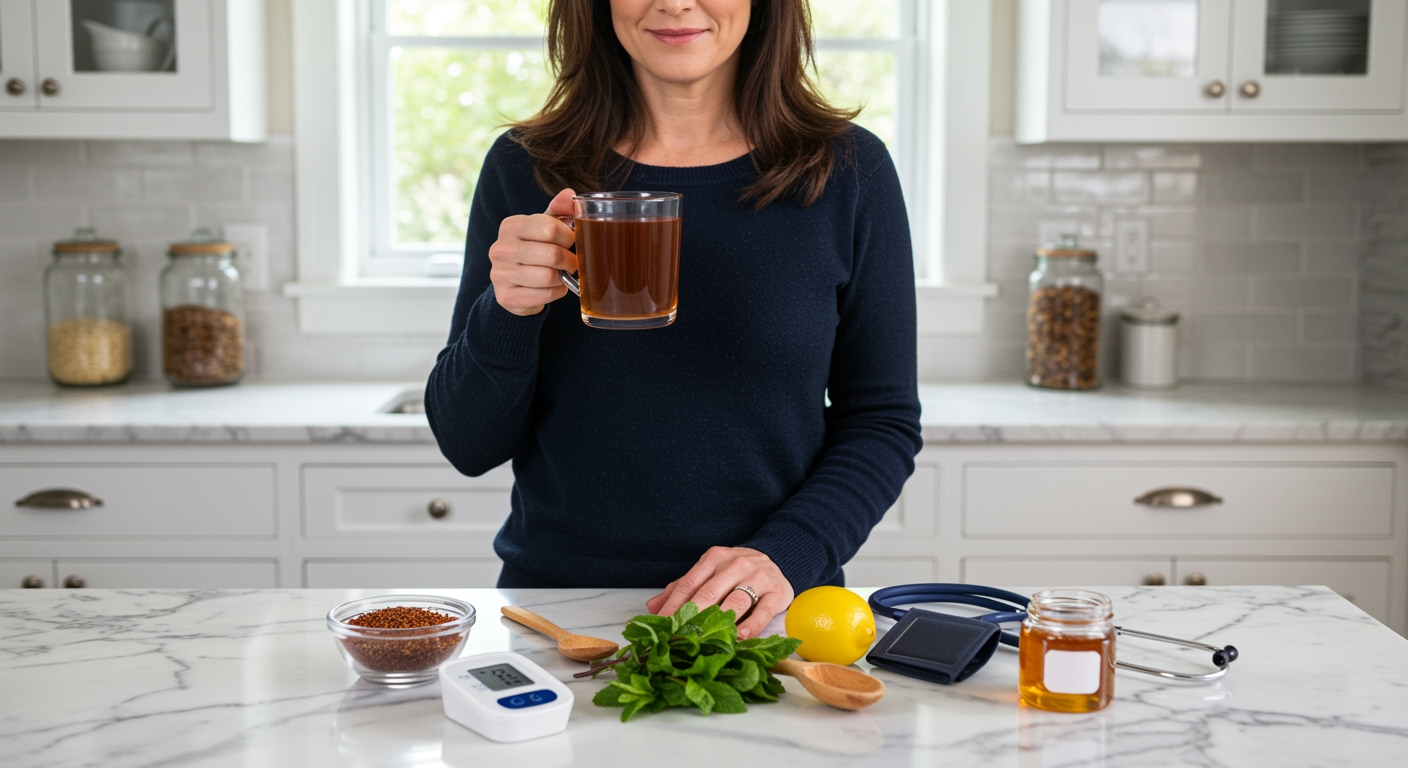✪ Key Takeaway: Rooibos tea can lower blood pressure, making it potentially problematic for people with already low blood pressure levels.
Introduction
Your doctor just told you that your blood pressure runs low, and now you are wondering about every drink in your kitchen cabinet.
You might be asking this question because you love your daily cup of rooibos tea but worry it could make your hypotension worse.
Hi, I am Abdur, your nutrition coach, and today I am going to explain exactly how rooibos tea affects blood pressure and whether you should continue drinking it with low blood pressure.
How Does Rooibos Tea Actually Affect Blood Pressure?
Rooibos tea contains powerful antioxidants called flavonoids that directly impact your cardiovascular system.
These compounds work by relaxing your blood vessels and improving blood flow throughout your body.
Research shows that regular rooibos consumption can lead to measurable reductions in both systolic and diastolic blood pressure readings.
The primary mechanism involves the inhibition of angiotensin-converting enzyme, which normally causes blood vessels to constrict.
When this enzyme is blocked, your blood vessels remain more relaxed and open, allowing blood to flow with less pressure against arterial walls.
This natural vasodilation effect explains why people with normal or high blood pressure often see improvements after drinking rooibos tea regularly.
✪ Fact: Rooibos tea contains no caffeine, unlike other teas that can temporarily raise blood pressure.
What Happens When You Have Low Blood Pressure?
Low blood pressure, medically known as hypotension, occurs when your blood pressure readings consistently fall below 90/60 mmHg.
Your body already struggles to maintain adequate blood flow to vital organs like your brain, heart, and kidneys.
Common symptoms include dizziness, fatigue, nausea, and fainting spells that can significantly impact your daily activities.
When blood pressure drops too low, your brain does not receive enough oxygen-rich blood, leading to confusion and difficulty concentrating.
Your kidneys may also struggle to filter waste products effectively when blood pressure remains consistently low.
Some people experience cold extremities because their circulatory system cannot efficiently deliver warm blood to hands and feet.
Understanding these mechanisms helps explain why adding blood pressure-lowering substances like rooibos tea might worsen existing hypotension symptoms.
✪ Note: Blood pressure below 90/60 mmHg is considered low and may require medical attention.
Should You Avoid Rooibos Tea With Hypotension?
The answer depends on your specific blood pressure readings and how your body responds to rooibos tea.
If your blood pressure hovers around 90/60 mmHg, drinking rooibos tea might push it into dangerously low territory.
However, if your hypotension is mild and you experience no symptoms, moderate rooibos consumption may be acceptable.
The key lies in monitoring your blood pressure before and after drinking rooibos tea to understand your individual response.
Start with small amounts, perhaps half a cup, and track any changes in how you feel over the following hours.
Pay attention to symptoms like increased dizziness, fatigue, or lightheadedness that might indicate your blood pressure has dropped too low.
Always consult your healthcare provider before making decisions about rooibos tea consumption if you have diagnosed hypotension or take blood pressure medications.
✪ Pro Tip: Keep a blood pressure log when trying rooibos tea to track your individual response patterns.
What Are Better Drink Options For Low Blood Pressure?
Several beverages can help support healthy blood pressure levels without the hypotensive effects of rooibos tea.
Green tea contains moderate amounts of caffeine that can provide a gentle, temporary boost to blood pressure readings.
Coffee offers a more significant caffeine content that can help raise blood pressure for several hours after consumption.
Beetroot juice, despite its reputation for lowering high blood pressure, can actually help stabilize blood pressure when consumed in small amounts.
Water with a pinch of sea salt helps maintain proper electrolyte balance, which is crucial for healthy blood pressure regulation.
Coconut water provides natural electrolytes that support cardiovascular function without dramatically altering blood pressure levels.
Remember that hydration plays a crucial role in maintaining adequate blood volume, which directly impacts blood pressure stability throughout the day.
✪ Fact: Dehydration can worsen low blood pressure symptoms by reducing total blood volume in your circulatory system.
The Bottom Line
Rooibos tea can indeed lower blood pressure, which makes it potentially problematic for people already dealing with hypotension.
The best approach to nutrition is always personalized – what works for others might not work for your unique body and health situation.
I would love to hear about your experiences with rooibos tea and blood pressure, so please share your thoughts or questions in the comments section below.
References
At NutritionCrown, we use quality and credible sources to ensure our content is accurate and trustworthy. Below are the sources referenced in creating this article:





